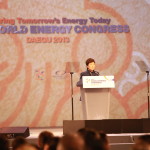
In response, increased global energy cooperation is needed, particularly between energy producing and consuming countries, which would contribute to global market stability. She said such cooperation was important for Asia, which has a mix of countries that are either heavy energy consumers or ones with large energy supply reserves.
“We have to explore new initiatives for energy cooperation in Northeast Asia,” she noted, citing the example of the construction of Russian gas pipelines to western Europe in the 1980s during the height of the Cold War.
She suggested that Northeastern Asia countries could cooperate in the development and transport of shale gas from China and North America as well exploiting oil and gas reserves in eastern Siberia.
“We have to create an environment that allows energy infrastructure connections, including regional power grids, gas pipe networks, and oil pipelines.” This cooperation could be promoted by legal frameworks, such as a Energy Charter Treaty, which would encourage investments from both the private and public sector.
In addition, the world must switch from a traditional energy economic model to a creative energy economy, which would promote energy conservation and environmental production through the use of smart grids, LEDs and low-emission vehicles. But to achieve this goal, the private sector needs to play an important financing role when governments face budget problems.
Economies need to adopt energy policies that would deliver “clean, safe and available energy for all.” Measures should include revising energy price frameworks and regulations to promote energy efficiency, a more equitable distribution of energy resources as well as encouraging investment in clean energy technology.
“Korea will play a leading role in resolving the energy trilemma facing the world,” she added, based on her domestic policy of promoting a “creative economy.”
“We can say that the paradigm of the creative economy will significantly contribute to the energy industry,” by achieving energy efficiency based on ICT, such as Energy Storage Systems (ESS) and Energy Management Systems (EMS). This would help cut the country’s energy consumption by 1 million kilowatts of electricity and create a 3.5 trillion won industry and 15,000 new jobs.
We will develop the energy industry into a driving force of the creative economy and share with the international community our know-how and experience in the transition to the creative energy economy,” Ms. Park said.





